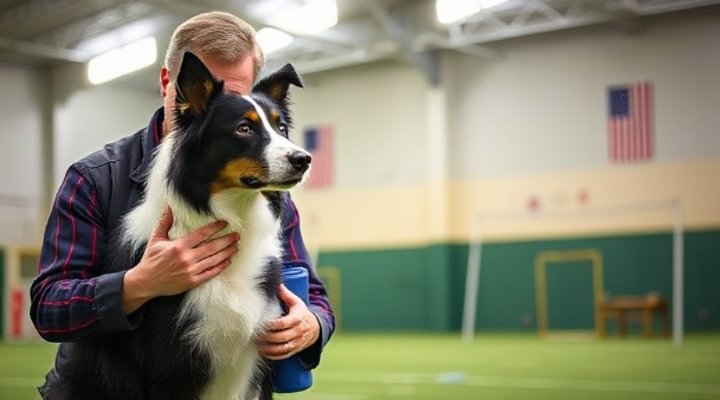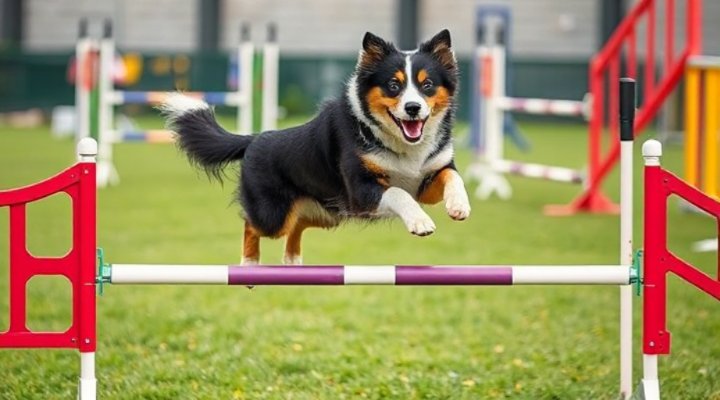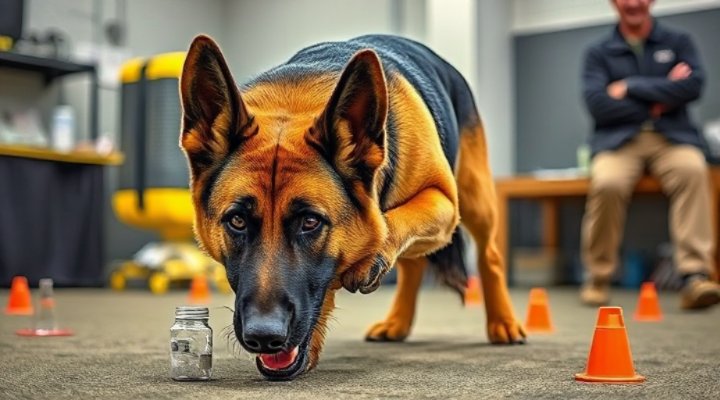Advanced dog training techniques represent the pinnacle of canine education, focusing on professional-level methods that transform ordinary pets into exceptionally skilled companions. These sophisticated approaches go beyond basic obedience to develop complex behaviors, problem-solving abilities, and specialized skills that showcase the remarkable intelligence and adaptability of our four-legged friends. Whether you’re working with working dogs, performance animals, or simply want to take your pet’s training to the highest level, these advanced methods will help you unlock your dog’s full potential while strengthening your bond through positive, reward-based techniques.

Understanding the Foundation of Advanced Canine Training
Before diving into complex advanced dog training techniques, it’s crucial to establish a solid foundation. Professional trainers emphasize that advanced skills build upon basic obedience, so ensuring your dog has mastered fundamental commands is essential. According to the American Veterinary Medical Association, proper foundation training significantly impacts a dog’s ability to learn advanced behaviors. Meanwhile, proper nutrition plays a vital role in your dog’s learning capacity – for dogs with specific dietary needs, consider exploring hydrolyzed protein solutions that can support cognitive function.
That is to say, you cannot expect a dog to perform sophisticated tasks without first mastering the basics. Consequently, assessment of your dog’s current skill level becomes the first step in advanced training. For example, if your dog struggles with basic commands, you might benefit from reviewing our guide on dog obedience training fundamentals before progressing to more complex techniques.
Professional Positive Reinforcement Methods
Modern advanced dog training techniques heavily rely on positive reinforcement principles. Above all, these methods focus on rewarding desired behaviors rather than punishing mistakes. Professional trainers have developed sophisticated reward systems that go beyond simple treat-giving, incorporating life rewards, play opportunities, and verbal praise in strategic combinations.
For instance, the ‘premack principle’ – using more probable behaviors to reinforce less probable ones – represents one of the more sophisticated advanced dog training techniques. Similarly, variable reinforcement schedules help maintain behaviors long-term without constant reward. Meanwhile, proper nutrition supports your dog’s training success; high-quality options like those discussed in our premium dog food review can provide the energy needed for intensive training sessions.

Advanced Obedience and Precision Commands
Distance Control and Hand Signal Mastery
One of the hallmarks of professional advanced dog training techniques involves teaching dogs to respond to commands at significant distances and through subtle hand signals alone. This requires breaking down behaviors into tiny components and building reliability through systematic training. The University of Pennsylvania’s veterinary program emphasizes the importance of gradual distance building in reliable command execution.
Furthermore, teaching duration commands – where dogs maintain positions for extended periods – represents another sophisticated skill. These advanced dog training techniques require exceptional patience and understanding of canine learning patterns. Additionally, dogs with specific health considerations might need specialized nutrition; for those with sensitive systems, our article on sensitive stomach solutions offers valuable guidance.
Complex Behavior Chains and Sequences
Professional trainers excel at teaching behavior chains – sequences of actions performed in specific order to accomplish complex tasks. These advanced dog training techniques involve ‘chaining’ individual behaviors together through careful reinforcement strategies. For example, service dogs learn elaborate chains for assisting people with disabilities, while performance dogs master intricate agility sequences.
Moreover, backward chaining – teaching the last behavior first and working backward – proves particularly effective for complex sequences. This approach ensures the dog always ends on success, building confidence and reliability. Meanwhile, maintaining peak physical condition through proper nutrition, as discussed in our raw diet guide, supports the physical demands of advanced training.

Specialized Skill Development Techniques
Scent Work and Detection Training
Advanced scent detection represents some of the most sophisticated advanced dog training techniques available today. Professional detection dogs can identify specific odors with astonishing accuracy, from medical conditions to prohibited substances. These skills build upon the natural canine olfactory abilities through systematic training methods.
Specifically, professionals use gradual scent introduction, discrimination training, and alert behavior shaping to develop reliable detection dogs. The training requires meticulous attention to detail and understanding of scent theory. Similarly, search and rescue dogs learn advanced air-scenting and trailing techniques that save lives in emergency situations.
Agility and Performance Training
Competition-level agility training embodies advanced dog training techniques that combine physical prowess with mental acuity. Professional handlers develop intricate handling systems, precise timing, and flawless communication with their canine partners. These methods go far beyond basic obstacle navigation to include strategic course analysis and split-second decision making.
Furthermore, advanced agility training incorporates collection exercises, independent obstacle performance, and sophisticated directional commands. The bond between handler and dog becomes particularly crucial at this level, requiring exceptional trust and communication. Proper physical conditioning, supported by nutritionally complete diets like those in our Instinct dog food analysis, ensures dogs perform at their peak ability.
Problem-Solving and Cognitive Development
Advanced dog training techniques increasingly focus on developing canine problem-solving abilities and cognitive skills. Professional trainers use puzzle boxes, interactive games, and structured problem-solving exercises to enhance mental flexibility and intelligence. These methods not only create smarter dogs but also provide essential mental stimulation that prevents behavioral issues.
For example, shape discrimination games teach dogs to identify specific objects based on characteristics, while memory exercises develop recall of multiple commands or locations. These advanced dog training techniques particularly benefit working dogs who must make independent decisions in field situations. Meanwhile, nutritional support for cognitive function becomes increasingly important; options like those reviewed in our raw nutrition benefits article can support brain health.

Behavior Modification and Special Cases
Professional advanced dog training techniques extend to complex behavior modification cases that require sophisticated understanding of canine psychology. Trainers working with fear, aggression, or anxiety cases employ counter-conditioning, systematic desensitization, and confidence-building exercises tailored to individual needs.
Specifically, these methods involve careful assessment, gradual exposure, and strategic reinforcement to change emotional responses and behavior patterns. The process requires exceptional patience, timing, and understanding of learning theory. For severe cases, consulting a professional behaviorist through resources like our finding a behaviorist guide becomes essential for implementing these advanced techniques safely and effectively.
Maintaining Advanced Skills Long-Term
One of the greatest challenges in advanced dog training techniques involves maintaining sophisticated behaviors over time. Professional trainers employ maintenance schedules, periodic retraining, and variable reinforcement to ensure skills remain sharp. This requires ongoing commitment and understanding of how canine memory and learning retention work.
Moreover, incorporating advanced skills into daily life helps maintain them naturally. For example, using hand signals during regular walks or practicing scent games during playtime keeps skills fresh without formal training sessions. Consistent nutrition also supports long-term performance; our review of Merrick dog food discusses options that sustain energy levels for ongoing training demands.
Conclusion: The Journey of Advanced Training
Advanced dog training techniques represent a journey of continuous learning and relationship building between handler and dog. These professional methods not only develop impressive skills but also deepen the bond through shared accomplishment and mutual understanding. Whether pursuing competition goals, working roles, or simply the satisfaction of developing your dog’s full potential, advanced training offers rewarding experiences for both species.
Remember that advanced training should always prioritize the dog’s well-being, using positive methods that respect canine nature while challenging intellectual and physical abilities. With patience, consistency, and proper support – including nutritional considerations like those in our sensitive stomach solutions – any dedicated owner can explore the fascinating world of advanced canine education.
Related Keywords: professional dog training methods, canine advanced obedience, sophisticated dog behavior modification, expert positive reinforcement techniques, competition dog training, service dog training methods, detection dog training, agility training advanced techniques, canine cognitive development, behavior chain training, distance command training, professional handler techniques, advanced reward systems, canine problem-solving training, specialized skill development

